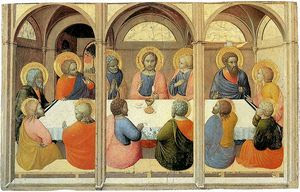Posts
Abortion is Not Health Care
- Get link
- Other Apps
Fr. Frank Pavone Pro-abortion politicians will often say to us, “Legislators should not be practicing medicine.” Our response? We’re not asking you to practice medicine, but to prevent the abuse of medicine. Medicine is for the purpose of preserving life; abortion takes life. Surgery helps the body do what it is supposed to do; abortion stops the body from doing what it is supposed to do. There is no disease that abortion cures. Legislators are not called to practice medicine. But laws do prohibit doctors from carrying out procedures without the patient’s consent, from using certain types of medications, and from all kinds of malpractice. The practice of medicine is regulated by all kinds of laws that protect the lives of patients. All we ask is that the unborn be included in that protection.
Prayer for the Beatification of Pope John Paul II
- Get link
- Other Apps
O Blessed Trinity, we thank You for having graced the Church with Pope John Paul II and for allowing the tenderness of Your Fatherly care, the glory of the cross of Christ, and the splendor of the Holy Spirit, to Shine through him. Trusting fully in Your infinite mercy and in the maternal intercession of Mary, he has given us a living image of Jesus the Good Shepherd, and has shown us that holiness is the necessary measure of ordinary Christian life and is the way of achieving eternal communion with You. Grant us, by his intercession, and according to Your will, the graces we implore..., hoping that he will soon be numbered among Your saints. Amen.
MARRIAGE: THE GOOD WINE (a wedding homily), Part 4 By Cormac Burke
- Get link
- Other Apps
To read Part 3 go here . The marriage vow is a vow of fidelity unto death. Its bond can never be broken except by death. Our Lord Jesus Christ proclaimed this in these solemn words: "What God has joined together let no man put asunder." The knowledge that you have freely and consciously accepted this life-long and unbreakable character of marriage, and are fully determined to maintain it, gives to each of you a deep trust in the quality of the love your partner feels for you. When people who believe in divorce get married, they can never have this assurance of an unconditional love on their partner's part. The very beginnings of their marriage rest on shaky foundations. In this Mass I pray with the Church that your marriage may be fruitful: that you may live to see your children's children to the third and fourth generation. Children are God's first gift and blessing to a married couple. Though many people today may seem to doubt this, may you never dou
Top Ten Reasons to be Catholic
- Get link
- Other Apps

This is Part I of my series “Top Ten Reasons to be Catholic.” 1.) The Eucharist – Catholics believe that the Eucharist is the Body and Blood, Soul and Divinity of our Lord Jesus Christ. Christ is present to us at every mass. This is the miracle of the Eucharist. In addition, the mass unites the Church, past present and future, in one time and place. This is because the souls of the faithfully departed who died in the friendship of God are present at the sacrifice of the mass. We who celebrate the mass here on earth represent the Church militant. Finally, the Church celebrates the reality of Christ’s second coming when the souls of all the faithful will live in Heaven with God forever. There is much more that could be said about the Eucharist and the mass. Let us conclude by acknowledging that the Eucharist is the Church’s greatest prayer; the source and summit of the Catholic faith. 2.) The Sacraments – In addition to the Eucharist are the other six sacraments; baptism, confessio
René Descartes: "Cogito ergo sum," "I think therefore I am."
- Get link
- Other Apps

In the previous post we talked about the challenge Descartes posed to Catholicism. We continue today with his "Cogito" "I think therefore I am." Descartes observes that sometimes our senses deceive us. When a straw is placed in a glass of water the water’s refractive properties make the straw appear bent. This optical illusion is precisely that, an illusion. How can we know what is real with certainty, Descartes asks, if we cannot always trust our senses? Because our senses are fallible in his search for certitude Descartes employs "hyperbolical doubt." In other words, for Descartes nothing is certain – not even reality itself. The fact that he can doubt, however, means something or someone exists to do the doubting. His mind thinks, in this case about doubt. Consequently, Descartes arrives at the first certainty, his famous "Cogito ergo sum," "I think therefore I am." Descartes goes on to prove that God exists and that He is